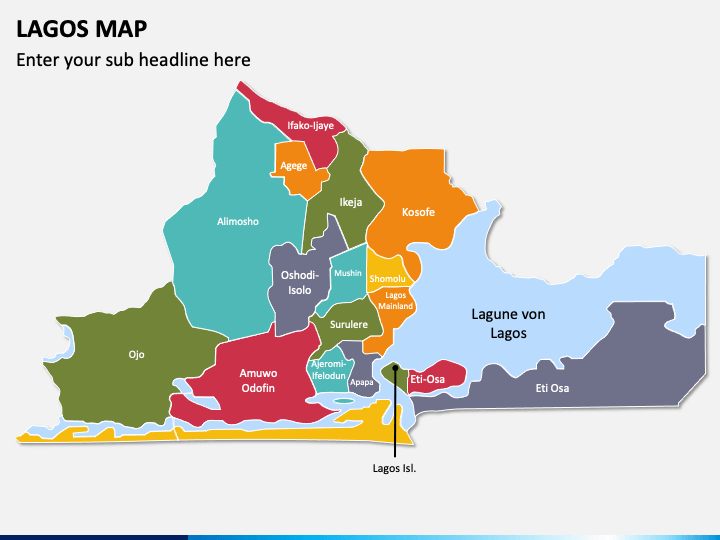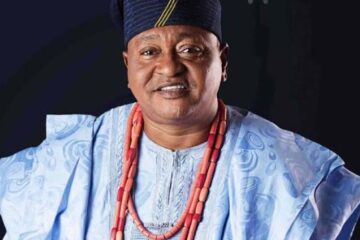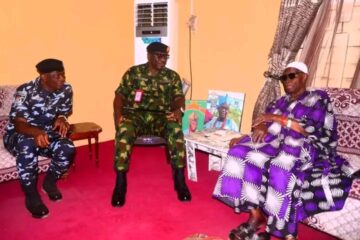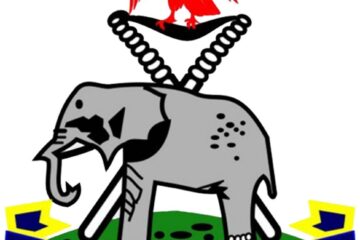Swimming in poverty inside ocean of wealth: Shocking conditions of Lagos riverine communities

That Lagos State ranks as the richest state in term of its Internally Generated Revenue is a fact. With earnings from FAAC, one would expect the centre of excellence to lead other states in terms of all-round development. However, Juliana Francis reports that reverse is the case in many communities.
Arapagi Community
Arapagi is a community located in the Ibeju-Lekki Local Government Area of Lagos State which can only be accessed by water.
One September morning, as the sun began to scorch the land, Victoria, who was pregnant and nursing, started contemplating her departure from the community through the perilous waterway.
The community does not have a healthcare facility that is equipped to handle childbirth. Similar to her first baby, Victoria needed to leave the community to give birth and then return afterwards.
Furthermore, the community lacks other basic amenities such as a secondary school, a police station, and potable water service, as our reporter discovered during a visit to the community. However, this is not a unique case.
During our visits to several other rural and long-disadvantaged Lagos communities, we documented multiple cases of shocking deprivation, which stand in stark contrast to the enormous wealth of Lagos State.
According to the National Bureau of Statistics, Lagos State had the highest Internally Generated Revenue with N267,232,774,434.06 in the first half of 2021.
In the first six months of 2022, the state got over N80 billion from the federation accounts, according to Dataphyte, which also reported that in 2021, the state’s LGs got N114,852,539,394, and N96,440,176,948 in 2022.
This means that the LG councils got N211 billion within two years, enough to revamp the infrastructural deficit at the grassroots.
Alhaji Kayode Jamiu, a building contractor in Abuja, who has handled health centre construction for local governments, said the sum of N80bn is enough to build 70 standard health centres at the cost of N100m each.
According to the Lagos State Commissioner for Economic Planning and Budget, Ope George, the state reported approximately N400 billion in internal revenues as of June 2023.
Despite the state’s revenues, by far the largest of all states, and contributions from the federation account, people like Victoria in rural communities across the state remain cut off from human capital and security enhancement services.
Victoria stated that many women in the community do not seek antenatal care during pregnancy due to the absence of nearby health centres. To access hospitals, these women and sick individuals have to travel by canoes, which is costly for a largely impoverished population, according to Victoria. That travel can also be deadly.
The secretary of the Community Development Association (CDA), Pastor Eletu Babatunde Isaac, said that just last year, the community was plunged into mourning following the death of a young lady. She died due to protracted labour and a young lad who was involved in a motorcycle accident also died due to bleeding.
Isaac said that both deaths could have been avoided if there was a health centre in the community.
The lack of basic amenities cut across communities in Lagos megacity. The Federation Account Allocation Committee (FAAC) gives monthly allocations to the Lagos State Government and its local government areas for the development of these communities.
Indeed, after FAAC gives these allocations to LGAs, the state government is also expected to augment the LGs’ funds. Coupled with these, the LGs also generate internal funds for the development of communities under their jurisdictions.
The sharing formula of the nation’s wealth towards development and capital projects; the Federal Government takes 52.68 per cent of the revenue share, states get 26.72 per cent, and local governments get 20.6 per cent.
Lagos State has an enviable Internally Generated Revenue (IGR), yet many communities are in despair at the grassroots. The state government appears to be pandering to the elite in the state by concentrating development on communities in the heart of Lagos, to the detriment of other communities perceived to be out of the radar of prying eyes.
The conditions of most communities visited by our reporter are shocking. FAAC money for years has failed to impact communities at the grassroots.
Lagos is believed to be among the richest states in Nigeria, even without recourse to FAAC allocations.
The Local Government Reform Act of 1976, states, that the Federal Government is to fund the local government with a statutory percentage share of the federation account while state revenue must also be shared with the third tier.
The functions of the local government are enumerated as the provision of health centres and dispensaries such as maternity at the grassroots, and water such as boreholes, drainage channels, roads and wells, etc.
The 1999 Constitution of Nigerian Section, 1, 2, 3, say Local governments’ sources of revenue are from “Allocation from the Federation Account, special grants from both the central and state governments. Levies on citizens and collection of rates on the radios and televisions, market shops, motor parks.”
The people in their complaints and demand for basic amenities, do not care if it is the local or state government that should be held responsible for the lack of basic amenities in their communities, they just want to be treated right as citizens.
Some of these basic amenities are responsibilities of the state government, amenities like secondary schools, and electricity. Although the state and LG councils have their duties and functions, these functions most times overlap.
The complaints in these communities are similar, ranging from lack of health centres, primary and secondary schools, clean water, electricity, bad roads, flooding, erosion, and absence of police posts, down to others.
The government not providing these amenities at the grassroots in Lagos State, shows a flagrant breach of the Nigerian Constitution and a deprivation of the citizen’s rights, experts say.
The former President of Nigeria, Muhammadu Buhari, the Chief Press Secretary to the late chairman Mr. Augustine Adeoye Arogundade of Agbodo-Oke Oda LCDA, Comrade Efe Brume, and a Public Affairs Analyst, Comrade Achike Chude, who is also the vice chairman of Joint Action Front (JAF), all said the chronic lack of development and basic needs at the grassroots was because the state governments have hijacked and starved LGs of money meant to perform their duties.
Most communities visited by our reporter admitted to contributing money to buy transformers to electrify their communities, repeatedly grading unpassable roads, and bringing water into their communities.
The lack of health centres in some communities continues to lead to maternal-infant mortality and other causes of death. We saw communities where government schools were not available and witnessed students trekking long distances to school. Community residents said some of their wards have dropped out due to tough schooling conditions.
The lack of access roads in some communities means plying perilous waters with death hanging over the heads of canoe passengers.
Isaac of the Arapagi community said the demise of the lady who died last year during labour was another statistic in the litany of avoidable deaths in the community. On educational of their children, he said many children drop out of school after primary education because the nearest secondary school is across the water, which is a major risk factor.
“They also have to spend more than N2,000 to and from school every day and most parents do not have that kind of money. Our children are forced to stop going to school,” said Isaac.
Among the seven towns in the community, two have never had electricity, while others have not had a power supply in the last year. They also asked for boreholes, because for now, only Lotu, one of the towns, has water recently provided by the Ministry of Local Government Affairs. Isaac said they mostly drink water from the stream.
Eleran-Egbe Community
The situation at the Eleran-Egbe Community in Ibeju-Lekki LG is not different from what is obtainable in the Arapagi Community.
The journey to Eleran-Egbe in September was torturous due to the horrific road fraught with deep mud holes, dirt and uneven patches. The means of transport to the community from the bus stop is motorcycle, which costs N6,000, while the journey takes about 45 minutes.
These are also the roads primary and secondary children trek to and from schools everyday. The sandy soil road makes it difficult for cyclists to manoeuvre and was said to have caused the death of many, leaving others with broken legs and crutches.
A youth representative in Ajegbewa town, under Eleran-Igbe, Mr Shonibanre Damilanre, said he was once a casualty of bad roads in the community.
He recalled how he fell off a motorcycle due to the poor condition of the roads, broke his leg and was incapacitated for seven months. He also said the roads and lack of health centres caused the death of his mother.
He said, “You must have noticed that from the Eleran-Igbe bus stop, it is difficult to get here. This is what we have been suffering for years. People who go to work and return at night are forced to trek because motorcycle riders would have to go home any time after 8pm. Moreover, motorcycles are very expensive and this is also because of the state of the road.
“Moses also had an accident and broke his leg on that road. Idowu and Ibrahim had similar experiences. As for Idowu, he has been on crutches for the past eight years. TK and Emma also had an accident on the road on the same day. Askari, a policeman, also had an accident on that road.”
Damilanre added, “Our farmers spend so much on transport to move their produce out of here and at the end of the day, they make little or no profit. If government can fix our roads, it will make our lives easier. It will open the door for transport business and create jobs for our youths.”
He noted that potable water is also missing in the community, revealing that they drink from the stream and well, stressing that such actions come with dire consequences.
“The government brought boreholes here 15 years ago, but it’s no longer functioning, and we’ve not had a power supply in the last 20 years.”
Olufemi Idowu, who had been using crutches for the past eight years after accident because he had no money for further medical care, said he would welcome government and non-governmental organisation (NGO) interventions, not just on the roads but also on his leg.
There is only one primary school servicing over seven communities under Eleran-Egbe. It was newly built and started operation this year, but there is no secondary school.
The primary school is a UBEC/SUBEB 2020 intervention project, and it is a block of six classrooms with two offices and a toilet.
According to a teacher at the primary school, Mrs Lasisi Funmilayo, most of the children in secondary school used to leave home between 5.30am and 6am to trek to school which is several kilometres away from the community.
She was also worried about insecurity at the primary school, revealing that the lives of the pupils were not safe due to the incursion of herdsmen, stressing the need to fence the school.
She said, “The lives of the pupils and teachers are not safe. There was a day when a cow attacked a pupil, and we had to rush him to hospital. Whenever these herdsmen come into our school, we tell them to leave, they tell us we are not the owners of the land where the school is built, that it belongs to the government.”
Funmilayo also spoke on the need for a secondary school.
She said, “Many of our children have dropped out of school because of distance and parents’ inability to charter motorcycles to take their children to school. To take them out of the community is N,2000 and to bring them back is also N2,000, To do that every five days in a week is expensive, let alone in a school term.”
She is perturbed over the unavailability of a health centre, saying people have died because there is no health centre and most times before a cyclist comes, an emergency would have become fatal. She said that people die from mere snakebites and injuries from farm tools.
“To get a woman in labour on a motorcycle is also not easy, but we continue to risk it. The nearest hospital to us is Epe and it’s very far. One of our sisters, Kikelomo went into labour at sundown, before we could rush her to the hospital, she had the baby on the road, but the baby died,” she added.
According to Funmilayo, ante-natal care for pregnant women is a luxury sought in Epe.
The National President Of The Nigeria Union Of Local Government Employees (NULGE), Mr Ambali Akeem, said communities at the grassroots remain in a shameful state because state governors continue to embezzle money meant for the LGs to carry out their duties.
He described the situation as an endemic problem, which could be traced to the gap in the 1999 Constitution which created the Joint Account Allocation Committee.
According to Akeem, it was supposed to be a basket or a pool of funds that would be available for infrastructure development and good governance at the LG levels.
“The drafter of that constitution never envisaged that we would have a set of greedy and selfish politicians that we have.
“Today, a substantial amount of allocation made for LGs are being diverted, misappropriated, misapplied and outrightly stolen by state political actors,” He added.
He explained that once the money was cornered, there was no way LGs would be able to operate.
“When the FG account allocation committee allocates between N100m and N150m to LGs, the money that is usually given to LGs is always less than N10 million. Over 90% of allocation meant for LGs are diverted and that has been the current reality. The blame is squarely on the table of the state governors,” he said,
The Chief Press Secretary to the late chairman, Mr Augustine Adeoye Arogundade of Agbodo-Oke Oda LCDA, Comrade Efe Brume, who is also a member of the United Action For Democracy (UAD), said corruption and extortion at the LG level by state government continue to hinder development at the grassroots.
He said he had worked closely with his principal and was able to determine that shocking corruption, greed and money politics are killing communities and its inhabitants.
He said: “The state governors see local government allocation as their private fund to disburse within their discretions. Once the allocation drops, it drops into a joint account of State and local governments. The local government Chairman will be summoned to the state secretariat for charge meaning they will now look at the formula and percentage on how to share the allocation.”
Brume said what most Nigerians do not know is that local government chairmen are stooges of the governors and as such, would not get their actual allocations and will not say anything.
He further mentioned that Lagos State has 20 local governments recognised by the Constitution, but Bola Ahmed Tinubu, during his administration as Governor in the state, carved out an additional 37 LCDA, making them 57.
Thus, whenever allocation comes, the state government after deducting a chunk, shares the remaining with the 57 local governments, while ordinarily, the money should be for just 20 LG. This, Brume said, is another problem retarding development at the grassroots in Lagos.
He added, “For instance, Alimosho is the largest and Tinubu created six LCDAs out of it. When there’s an allocation of N18 million, it will be split into six. The parent local government will get the larger share, but the rest of LCDA will get another allocation. But the worst aspect of it is that once the allocation drops, they will ask the Local Government Chairmen to sign for N18 million.
“Moving forward after signing for the N18 million he may eventually get N10 million.
That means the state governor has diverted N8 million out of the N18 million.
“The local government chairmen themselves will steal N2 million out of the N10 million. The remaining N8 million is meant for the local government and then they still must pay salaries. I am talking from experience.”
He argued that with such flagrant corruption going on, there was no way any LG would be able to build or rehabilitate roads or develop communities.
He added that local government chairmen also have to pay “political leaders’ salaries,” including House of Rep members, the leader of the LG will collect stipends, the House of Assembly of that LG will also collect their salary, chairman of the party and some leaders will also collect, said Brume.
He asked rhetorically, “When an LG gets N10m as allocation and spends N6m to pay political leaders, what can a chairman do with N4m?”
He alleged that most political leaders in Lagos see the LG as their private company, demanding money for “marriage, burial ceremony, hospital bills and school fees.”
He identified another hindrance to grassroots development as the mismanagement of internally generated revenue. Brume said that it would be good to start asking LG chairmen to publish their allocations, spending and projects.
This reporter visited the Lagos State Ministry of Local Government and Chieftaincy Affairs, to discuss the challenges confronting LG councils with officials.
The spokesman, Adebayo Kehinde, said he would not be able to speak on such matters, but that his commissioner would. He asked the reporter to forward questions to his WhatsApp.
That was on September 25, 2023, but as of the time of filing this report, the questions were yet to be responded to by the ministry.
This Report was Facilitated By The Wole Soyinka Centre For Investigative Journalism (WSCIJ) Under Its Collaborative Media Engagement For Development, Inclusivity And Accountability (CMEDIA) Project.











